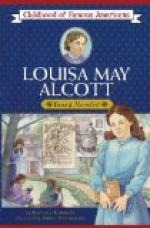|
This section contains 5,859 words (approx. 20 pages at 300 words per page) |

|
SOURCE: "'Playing Puckerage': Alcott's Plot in 'Cupid and Chow-chow'," in Children's Literature, Vol. 14, 1986, pp. 105-21.
In the following essay, Keyser finds a radical feminist subtext in Alcott's children's story "Cupid and Chow-chow. "
Louisa May Alcott, despite the critical attention that she has recently received, remains underrated as a literary artist and misunderstood as a feminist. Eugenia Kaledin, although she puts the case more strongly than most Alcott critics, speaks for many when she deplores the fact that Alcott's "acceptance of the creed of womanly self-denial . . . aborted the promise of her art and led her to betray her most deeply felt values" [Women's Studies, Vol. 5, 1978]. Like Kaledin, Judith Fetterley believes that Alcott preserved her artistic and moral integrity only in her anonymous and pseudonymous sensational stories. According to Fetterley, "What these stories . . . make clear is the amount of rage and intelligence Alcott had to suppress in order to attain...
|
This section contains 5,859 words (approx. 20 pages at 300 words per page) |

|


